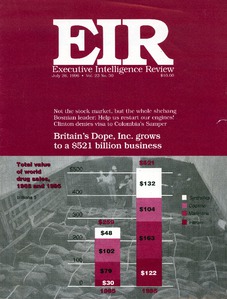Interviews
Fans Nanic
The new chief of staff of Bosnia’s President Izetbegovic, formerly spokesman for the Defense Ministry, talks to EIR about the need to “ignite the engine of our reconstruction.”
Book Reviews
Parody of J. Edgar in the White House
by Edward Spannaus
Unlimited Access: An FBI Agent Inside the Clinton White House, by Gary Aldrich.
Departments
Editorial
Britain’s War against Ireland.
Economics
It’s Not the Stock Market, but the Whole Shebang
by Anthony K. Wikrent
Lyndon H. LaRouche, Jr. tells a seminar in Washington, D.C. that the wild swings in the stock market indexes are a symptom of the underlying instability of the world banking system.
Swedish Conference: Win the War on Drugs
by Karen Steinherz
Sweden has taken leadership in trying to make its nation drug-free, but international collaboration is essential to win the war.
Currency Rates
Business Briefs
Special Report
Britain’s ‘Dope, Inc.’ Grows to $521 Billion
by Dennis Small
Refutes the defeatism which says the war on drugs can’t be won, and announces the forthcoming new edition of Dope, Inc., the battle manual to put the drug cartel out of business for good.
Cocaine: Production Set for a New Takeoff Stage
by Dennis Small
Marijuana: A $150 Billion Chunk of Dope, Inc. Production
by Valerie Rush and Joyce Fredman
Heroin: Britain’s Opium Wars—Two Centuries, and Going Strong
by Joseph Brewda
Synthetic Drugs: Pharmacological ‘Revolution’ Sweeps Europe, America
by Jeffrey Steinberg
The British Oligarchy’s Global Drug Money-Laundering Machine
by Richard Freeman
Russia and Eastern Europe: Dope, Inc.’s Newest ‘Growth Market’
by Linda de Hoyos
The Dope, Inc. Invasion of the Russian Economy
by Roger Moore
A Winning Strategy: How Drugs Can Be Wiped Out, Totally
by Dennis Small
LaRouche’s War on Drugs: A Bibliography
International
Clinton Pulls Samper’s Visa for Abetting Drug Trade
by Robyn Quijano
Documentation: Speeches at the Center for Colombian Studies by Armed Forces Commander Adm. Holden Delgado and Army Commander Gen. Harold Bedoya show how Colombian patriots are preparing to take back their country from the drug armies.
TransAfrica’s Payne Fields Anti-Sudan Bill
by Linda de Hoyos
The ‘Ron Brown II’ Mission to Bosnia: A Chance To Defeat the British
by Umberto Pascali
U.S. Commerce Secretary Mickey Kantor’s trip to Sarajevo signals a renewed American commitment to rebuilding the Bosnian nation. What’s needed is a new Marshall Plan.
International Intelligence
National
President Clinton Is Back on the Policy Offensive
by Jeffrey Steinberg
U.S. foreign policy initiatives since the Lyons summit of the Group of Seven, suggest that the President is rejecting the bad advice of campaign strategist Dick “Rasputin” Morris. Will he go the next step, and dump Morris himself?
House Republicans Cover Up Justice Department Role in Waco
by Edward Spannaus
Two Cases Show Real Corruption of DOJ
by Jeffrey Steinberg
Republican muckrakers aren’t looking into the railroading of John Demjanjuk and the assassination of Tscherim Soobzokov by the DOJ permanent bureaucracy.
Congressional Closeup
by Carl Osgood
National News
Correction
Correction
On p. 28 of our last issue, Figure 1 should have included the size of the U.S. labor force as of March 1996. The total labor force was 133.7 million, of which 34.7 million were employed in productive occupations and infrastructure, and 98.9 million in “overhead.”



